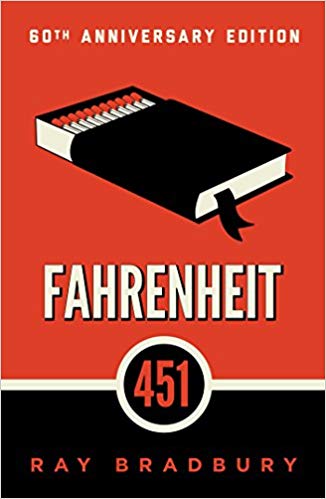Fahrenheit 451 by Ray Bradbury
Tags: sci-fi,
The most disturbing thing about this book is that the vapid, false, and mind-numbing world that the media produces and the population so whole-heartedly consumes is so much like our own. The narrator points out more than once that the government didn’t take the initiative to ban books (and by extension, reflection and depth of thought and experience); the people themselves stopped wanting them.

In this world, humanity has rejected its own cultural history and the hard-won wisdom of preceding generations in favor of comfort and isolation. They choose to consume life second-hand, as remote spectators, accepting whatever their screens feed to them.
They wanted instead a world of empty thrills and non-stop stimulation. And then they wonder why they’re not happy. They don’t even understand their feelings of dissatisfaction, because those feelings have no place and no representation in the media-produced world they consume. Guy Montag doesn’t understand quite why he’s unhappy today, after being perfectly fine yesterday. His wife Mildred almost kills herself with an overdose of sleeping pills and doesn’t even know it.
In this world, war is entertainment, one more flash of excitement on the screen. War’s death and destruction are distant and abstract. As one character puts it, death is something that happens to other people’s husbands.
Everyone in this world is asleep, and they don’t even know they’re asleep. Swap out a few details–TV for the internet, the three-walled televisions for smart phones–and you have something pretty close to the world we live in now. Even the manner of death the society chooses for its outcasts is ironic: the robot dogs hunt them down and numb them to death with massive injections of procaine (novocaine).
What do you do with a world like this? Bradbury gives us the analogy of the Phoenix that must descend into self-immolation before it can rise again.
Fahrenheit 451 is an allegory. Bradbury doesn’t spend a lot of time on character development, because the characters aren’t the point. They’re merely types against which the characteristics of the world he portrays come into sharp relief. It’s a chilling read, not because it makes you think of the dystopia into which the world may someday evolve, but because it so uncannily portrays aspects of the world we live in right now.